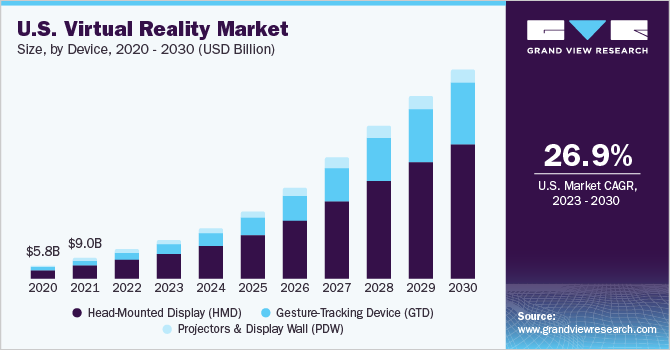Virtual Reality (VR) technology has transcended its origins in gaming and entertainment to become a pivotal tool in various other industries. Modern education, aerospace, defense, and healthcare all use it. In healthcare, VR offers innovative solutions across various medical domains by immersing both patients and professionals in simulated environments.
Today, medical students and professionals are using VR for immersive education. Platforms such as Osso VR offer realistic surgical simulations, allowing trainees to practice procedures and receive feedback in a controlled environment. It enhances learning outcomes.

According to the Grand View Research estimates, the demand for VR technology in healthcare is expected to register the highest CAGR of 32.2% from 2025 to 2030. On the other hand, the global Virtual Reality (VR) Market is expected to reach $435.36 billion by the year 2030. Let us try to understand why the demand for VR is growing in the healthcare sector and how it is utilized there.
Surgical Planning and Training
VR devices enable surgeons to rehearse complex procedures in a risk-free, virtual setting. They allow for detailed preoperative planning. Platforms such as Surgical Theater's Precision VR take the 2D CT and MRI images and render them into a 360°VR map of the patient's anatomy. Such practices enhance precision during actual surgeries. Organizations such as Stanford University School of Medicine use VR technology to create 3D models from medical images for pre-operative practices.
With the help of VR headsets, surgeons can also collaborate with colleagues and mentors remotely, receiving guidance and feedback in real time.
Pain Management
VR has also emerged as an approach to pain relief. Obviously a non-pharmacological one! Clinical trials have demonstrated that cancer patients using VR experienced significant and sustained pain reduction compared to those receiving standard care. This suggests VR's efficacy as a complementary tool in pain management strategies.
VR has the ability to create a highly immersive experience that occupies attentional resources and prevents the brain from focusing on painful stimuli. It basically works as a distraction.
Mental Health Therapy
Therapists have started utilizing VR to treat conditions such as PTSD (post-traumatic stress disorder), anxiety, and phobias. Virtual Reality Exposure Therapy (VRET) has been employed to help patients confront fears in controlled environments. The idea is to create virtual environments that mimic real-life situations that trigger anxiety. It helps the patient get used to scary objects or situations, leading to notable improvements.
Physical Rehabilitation
Rehabilitation programs are also incorporating VR to motivate patients and make recoveries better. Virtual Reality-based Rehabilitation (VRBR) utilizes VR technology to enhance rehabilitation for musculoskeletal injuries, post-stroke, and neurological disorders. It can create an engaging environment for patients to practice and improve balance and functional abilities.
Individuals with ASD (Autism Spectrum Disorder) use VR to practice social interactions and life skills. VR environments provide safe spaces for users to engage in scenarios that enhance their social understanding and daily functioning, contributing to improved quality of life.
Elderly Care and Cognitive Health
VR is proving beneficial in elderly care and cognitive health as well. It helps combat loneliness and cognitive decline. In January 2024, a Dallas-based company Mynd Immersive, launched the Great American Elderverse initiative with an aim to transform the lives of older adults. The campaign offers seniors virtual experiences such as hiking the Alps or attending Broadway shows, leading to improved cognitive function and reduced feelings of isolation.
Order a free sample PDF of the Market Intelligence Study, published by Grand View Research.
Some of the key Healthcare Virtual Reality companies are:
- Vicarious Surgical
- Osso VR
- apoQlar
- eXeX
- AppliedVR
- XRHealth
- Tripp
- Mynd Immersive
- Limbix

No comments:
Post a Comment